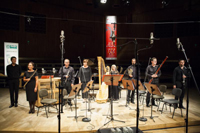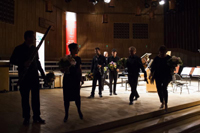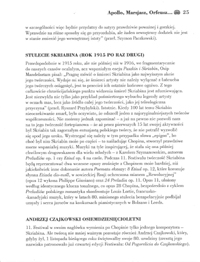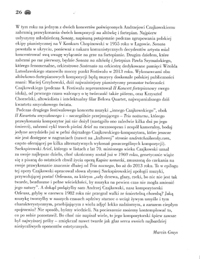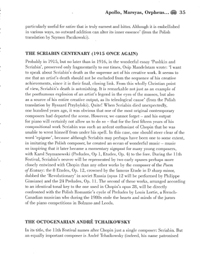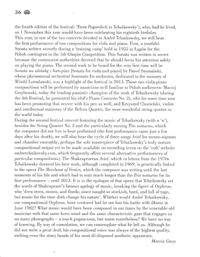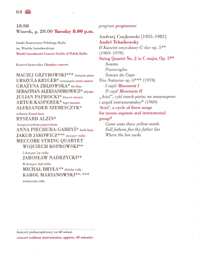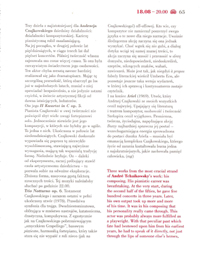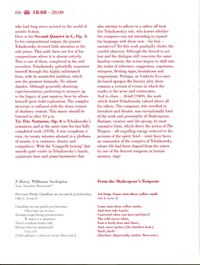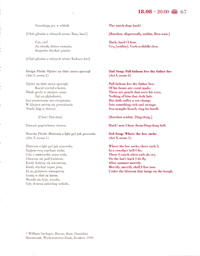|
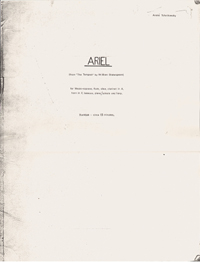
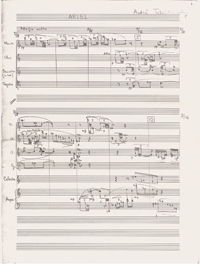
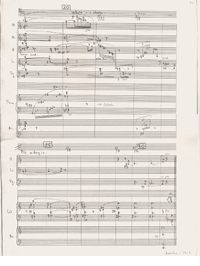
Manuscript
Sample
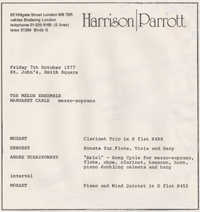 Concert Program
Concert Program
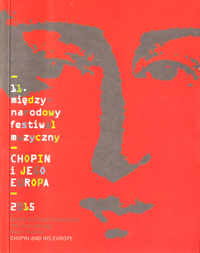
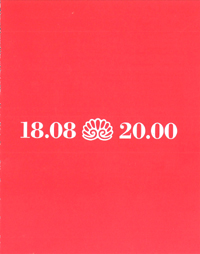
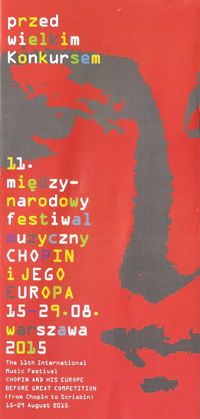
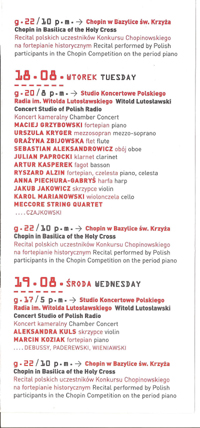
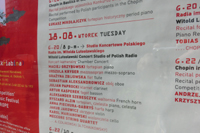
Warsaw, August 18, 2015
|
"Ariel"
(1969)
This
webpage provides information about the André Tchaikowsky composition,
"Ariel" (1969). This includes text from the book, The Other
Tchaikowsky - A Biographical Sketch of André Tchaikowsky.
There are three known performances: the world premiere performance on
October 7, 1977; another in Denmark in 1985 to honor the 50th anniversary
of André's birth, and the performance at the 2015 Chopin and
his Europe Music Festival on August 18, 2015. A fourth performance is
scheduled for November 1, 2015 (see below).
(2015)
Ariel / Royal College of Music "André Tchaikowsky"
Day
The 80th anniversary of André Tchaikowsky’s birth was celebrated
with Dr. Anastasia Belina-Johnson as she introduced the man and his
music in an afternoon of talks and performances. Performances included
Ariel. Read More (PDF file).
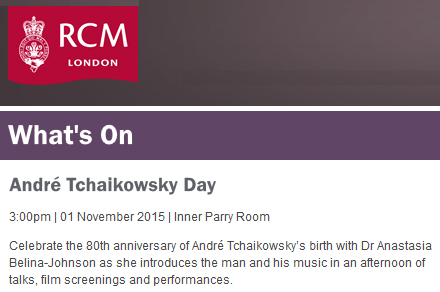
(2015)
Ariel / Chopin and his Europe Music Festival
Ariel was a featured work on August 18, 2015 as part of the Chopin
and his Europe Festival program. See
the links below for music samples, followed by images from the concert
and festival program. The world premiere performance in 1977 was recorded,
but André rejected the recording and it was destroyed. The Denmark
performance was not recorded, however, the Warsaw performance was recorded
for future broadcast on Polish Radio. Click
Here for a news article (in English).
Full
fathom five thy father lies - ariel_song1.mp3
Come unto these yellow sands - ariel_song2.mp3
Where the bee sucks - ariel_song3.mp3
1st
Song: Full fathom five thy father lies (Act 1, Scene 2)
Full
fathom five thy father lies;
Of his bones are coral made;
Those are pearls that were his eyes;
Nothing of him that doth fade
But doth suffer a sea-change
Into something rich and strange.
Sea-nymphs hourly ring his knell: [Ding-dong.]
Hark! now I hear them-Ding-dong bell.
2nd
Song: Come unto these yellow sands (Act 1, Scene 2)
Come
unto these yellow sands,
And then take hands:
Courtsied when you have and kiss'd
The wild waves whist,
Foot it featly here and there;
And, sweet sprites, the burthen bear.
Hark, hark!
Burthen. dispersedly, within
The watch-dogs bark!
Burthen Bow-wow
Hark, hark! I hear
Cry, Cock-a-diddle-dow.
3rd
Song: Where the bee sucks (Act 5, Scene 1)
Where
the bee sucks, there suck I;
In a cowslip's bell I lie;
There I couch when owls do cry.
On the bat's back I do fly
After summer merrily.
Merrily, merrily shall I live now
Under the blossom that hangs on the bough.
From the
biography The
Other Tchaikowsky
By early 1969, André began to compose, but the composition wasn't
inspired by "The Merchant," rather, by "The Tempest."
The result was "Ariel." It is written for mezzo-soprano, flute,
oboe, clarinet in A, horn in F, bassoon, piano/celesta, and harp. The
words for the three songs of Ariel are taken directly from Shakespeare's
play, "The Tempest." The exact reason why André composed
"Ariel" isn't known, but it is believed that he had in mind
writing something for singer Margaret Cable. However, it had poor prospects
for being performed, given the number of musicians involved and the short
duration of the work. The vocal part was very difficult as well.
However,
in the early 1970s André met Chad Varah, rector of St. Stephen
Walbrook in London, and founder of the Samaritans, an organization to
befriend the suicidal. It perhaps took a champion of lost causes of
this dimension to bring about a performance of "Ariel." Chad
Varah believed all of André's compositions should be heard in
concert, and arranged for a performance of "Ariel." Chad Varah:
"André
told me that the only work of pure genius amongst his compositions
to date was 'Ariel.' He said it will never be performed because it
is for nine instruments, including a mezzo soprano, and who can afford
to gather nine soloists for a piece that lasts five minutes? I told
André that I was determined he should have a performance. I
said that he should not go to his grave without hearing his work of
genius. What I did was arrange a concert at St. John's Smith Square
in aid of the restoration of the church, St. Stephen Walbrook, and
worked out a program that would use the players in other compositions.
"We
assembled the requisite players and André played the piano
himself and also played the celesta. He said jokingly afterwards it
had been rather expensive to hire the celesta, which was largely a
visual aid because the sound from it was so slight. You could see
him playing, but you could hardly hear him.
"This
was the only time I was ever annoyed by André. We had arranged
for a professional recording van to be parked outside St. John's Smith
Square and made a recording of the whole concert, but particularly
to make a separate little tape of 'Ariel.' Margaret Cable missed a
bar in the performance. It didn't ruin the whole thing, but it left
a little bit out, and André was so disappointed with the tape,
because it wasn't 100 percent perfect that he had it destroyed. I
took the view that, since I had paid for this concert, for his pleasure,
even if he didn't like the tape, he ought to have given it to me,
or at least mentioned it to me before having it destroyed."
The performance
described by Chad Varah took place on October 7, 1977. Other works on
the program included Mozart and Debussy. It cost £89 to produce
the tape which André destroyed. The concert was reviewed by Max
Harrison of The Times:
Melos
Ensemble/André Tchaikowsky
André
Tchaikowsky's "Ariel" seemed a great deal more conventional
than either of the preceding works [Mozart and Debussy]. Written in
1969 but receiving its first performance, this is a setting of Ariel's
three songs in "The Tempest" with accompaniment by a septet,
including piano and celesta played by the composer. The sensitive
melodic lines, expressively sung by Margaret Cable, indicate a style
that is astringently romantic rather than in any way modern. The most
interesting sections of the instrumental part were the interludes,
which are quite densely contrapuntal. However, Mr. Tchaikowsky's ensemble
scoring was effective throughout, each detail pulling its weight.
"Ariel" was, in fact, an agreeable piece, well crafted,
although not at all memorable.
The mention
of the interludes being "densely contrapuntal" was a common
complaint from musicians that knew André's music. Margaret Cable's
husband, John Fletcher, was at the "Ariel" concert and gave
a general impression of André's compositions. John Fletcher:
"André's
music was crowded with ideas, which used to go off almost like a Roman
Candle. To me, he hadn't mastered the art of pruning and where to
put the 'punch.' I found his compositions like André himself
when he was most diffusive, sort of saying three things at once and
leading on terribly fast. This was like his mind during conversation,
very fast moving and his music was similar. At the end of his music,
I was tired out because there was so much happening; it finally left
a diffusive impact because of it. If André had lived a proper
life span, I think he would have slowly crystallized what he wanted
to say musically. Towards the end of his life, I know he was working
on this."
"Ariel"
was performed in Denmark in 1985, arranged by André's good friend
Lars Grunth. The music has never been published and, after these two
performances, "Ariel" has never been heard again publicly.
The work is dedicated to Robert Erwin, a New Zealand friend. The original
manuscript is in the Josef Weinberger archives.
UPDATE
- The music for Ariel has been published and is available from Josef
Weinberger. A third performance was in Warsaw on August 18, 2015.
|
 Concert Program
Concert Program









